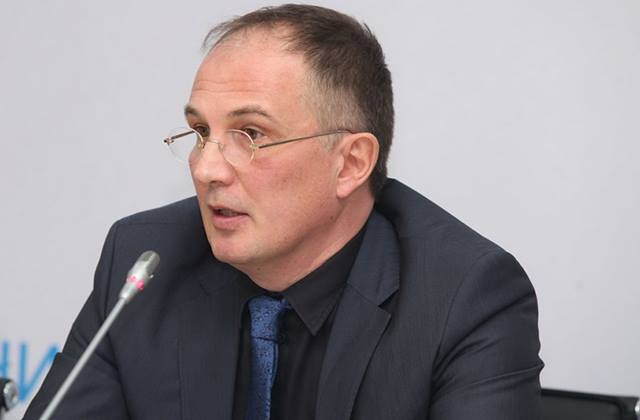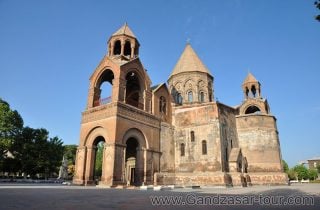Nothing to Change in Moscow-Yerevan and Moscow-Baku Relations in Future

Interview with Konstantin Kalachov, head of Moscow’s Political Experts Group.
–To all probabilities, the USA will also try to organize Sargsyan-Aliyev meeting at Nuclear Security Summit (NSS) to be launched next week. In your opinion, what may we expect from it?
-Apparently, nothing, no progress will be recorded at that meeting. Of course, personal meetings are good. For instance, Putin also met Poroshenko at various platforms, but the Donbass issue wasn’t settled, thus formal meetings aren’t decisive in this regard. Actually progress is conditioned by availability of mutually acceptable solutions. Are there any solutions acceptable for both parties, especially in which issue shift may be regarded? As per today dispositions of Armenia and Azerbaijan are totally contradicting one another, and even if RA president Serzh Sargsyan and Azerbaijani president Ilham Aliyev shake hands in Washington, only Minsk group co-chairs may say it’s the result of their work, and this is a perfect PR for Minsk group. Moreover, last Sargsyan-Aliyev meeting has been initiated through serious efforts, and negotiations on NKR issue settlement entered a deadlock. The outcome of that meeting, I consider, will be zero in practice.
–The USA has a proposal on investment of international mechanism of maintenance of ceasefire regime. Before the Summit, the US Secretary of State will visit Russia. Is it possible that the issue will be included in the agenda? Until now Russia didn’t express any disposition on that mechanism, and Baku denies it.
-Attempts of oppressions over Armenia are for obliging negotiations to it. In fact, Azerbaijani side presupposes, there are no clashes on border, we don’t speak of wide-scale military actions, then the NKR issue will be successfully forgotten, it’s not the most actual among the international community. Only Armenia is interested in termination of escalation, as for Azerbaijan, it’s a means of attaching the attention of international community and directing the issue on its preferred way. Frozen conflict is beneficiary for other parties, issue of settlement may be passed on to next generations, OSCE will imitate some development, however, in fact, nothing will change. I consider, especially when manat was collapsed together with oil prices, although they’ve gone up a bit now, however, in general, they are low, and Azerbaijan faces serious economic problems, and from domestic policy perspective foreign policy success is more crucial for Aliyev, i.e. positive dynamics in conflict settlement should be shown to Aliyev more than ever. And instead of bread, he should offer sights.
–Why is Moscow silent on this mechanism?
-For Moscow smooth relations with both of them are important, and to some sense, Moscow tries to remain seated on two chairs. It’s clear, one country is an ally, and the second one—a partner, and problems are needed neither here nor there, however, there is conflict, settlement of which supposes one party should make a compromise to the other. Moscow perfectly understands that against the background of recent developments in Armenia, the public is discontent with cooperation with Russia and for the latter it’s crucial to smooth wrinkled ways; the issue of supply of weaponry to Armenia had been risen recently, which, for unknown reasons is considered illegal in Azerbaijan, i.e Moscow tries to maintain maximal good ties with both of them, and manifestation of tough disposition means losing either an ally or a partner. Politics is an art of possibilities, real politics presupposes maneuvering, and Moscow in no way betrays Armenia’s interests, but it doesn’t want to distort ties with Azerbaijan as well.
–On account of the fact that settlement of the conflict is of utmost importance for stability and security in the Caucasus, what changes may lead activation of the USA to?
-Really, change of Iran’s role in the region demands active actions by the USA, i.e. lifting sanctions doesn’t mean all issues are settled. It’s worth taking Turkey’s role into consideration as well. Under existent situation Iran’s role increases. It’s clear that the USA will activate its efforts to maintain and increase its role in the region. What may this lead to? The USA is currently at pre-election period, and Obama has more everyday issues, than that of the Caucasus. For instance, visit to Cuba is more important for him. Barak Obama wants to leave a trace in history , however, the Caucasus isn’t among its priorities, and new “broom” may “sweep” well, i.e. on the one hand, the USA shows diplomatic activity, there are certain restrictions though. Some efforts linked to Iran will be implemented, but it’ll be finally visible next year, after new president is elected, and how may foreign policy of the USA change.
–In early April S.Lavrov, RF MFA, will visit Baku. Which issues will be included in the agenda of his visit? Again weaponry supply or other issues?
-Moscow is eager to develop not only military but also economic cooperation with Baku, and there are lots of issues: systemization of issues of the Caspian Sea, energy resources, activities in this or that market and etc., which are more crucial than weaponry supply. Sharpening of Russia’s ties with Turkey opened new perspectives for Azerbaijan, including substitution of goods, for instance, Azerbaijani tomatoes appeared in Moscow, but, of course, I think, Lavrov will not only discuss Azerbaijani tomatoes in Moscow.
–Just about at the same period visit of Russia’s Prime Minister to Armenia is scheduled on April 7. Although it has been twice announced that D.Medvedev will visit Yerevan, the visits didn’t take place though.
-I consider, this time he’ll come. There is an issue of equality and policy of balance maintenance, that Russia’s ties were parallel build with the two states, and more attention was paid to neither parties, so that the other gets offended. Note, however, regarding status, Prime Minister is higher than the Minister of Foreign Affairs. We shouldn’t say that Armenia is out of sight, Putin also visited your country. I consider, in near future, nothing will change in Moscow-Yerevan and Moscow-Baku relations. There is another crucial circumstance as well, that is worth remembering, Azerbaijan won’t launch war, i.e. Baku isn’t ready to take a risk, as, in fact, the result is unpredictable. And if there is no real threat of war in the Caucasus, there is no need to essentially change anything.
–Armenia’s government has hope that Medvedev will announce on reduction of price for gas supplied to Armenia. If it occurs, it may clearly become support for the authorities, especially in the context of coming parliamentary elections. What do you think what other election dividends may Armenia’s authorities obtain from Russia?
-Besides gas, I consider, direct financing of other projects may be included in the agenda as well, although Russia is in difficult financial situation. Main topic includes energy resources, EEU issues, general security and etc. And economic preferences affect political dividends as well. Today it’s difficult speaking of trade turnover, increase in investments and any economic development. We should try to show, that Russia’s cooperation is beneficiary to Armenia, but on which topics, it’s difficult for me to say. Currently economic expectations in Armenia are conditioned by political developments.
By Gayane Khachatryan

























